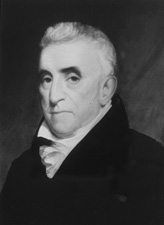David Daggett
| David Daggett | |
|---|---|
 |
|
|
United States Senator from Connecticut |
|
|
In office May 13, 1813 – March 4, 1819 |
|
| Preceded by | Chauncey Goodrich |
| Succeeded by | James Lanman |
| Member of the Connecticut House of Representatives | |
|
In office 1791-1797 |
|
| Personal details | |
| Born |
December 31, 1764 Attleboro, Massachusetts |
| Died | April 12, 1851 (aged 86) New Haven, Connecticut |
| Political party | Federalist |
David Daggett (December 31, 1764 – April 12, 1851) was a U.S. senator, mayor of New Haven, Connecticut, Judge of the Connecticut Supreme Court of Errors, and a founder of the Yale Law School.
He was born in Attleboro, Massachusetts, December 31, 1764, the son of Thomas Daggett. The history of Dagget's family in Massachusetts is a distinguished one. The original Dagget, John, came over from England with Winthrop's company, in 1630, and settled in Watertown.
At the age of 16, he enrolled at Yale, entering the junior class two years early. It appears likely that he entered Yale rather than Harvard, which was closer, because his father's cousin had been an officer at Yale. He graduated with high honor in 1783 and then earned a master's degree. Daggett was in the same class with Samuel Austin, Abiel Holmes and John Cotton Smith.
Upon receiving his master's degree, he received the unusual honor of having his commencement speech published. This marked the beginning of his reputation as a formidable orator.
In 1786, at the age of 21, he married Ann Munson. They were married for 53 years, until she died in July 1839 at the age of 72. Daggett had 19 children, but only 14 lived any considerable time, and only three survived him. One son was clergyman Oliver Ellsworth Daggett. One daughter, Susan Edwards Daggett, married Chaplain of the Senate Reverend Sereno Edwards Dwight, son of the President of Yale, Timothy Dwight IV.
After leaving Yale, he studied law under Charles Chauncey of New Haven (who later became a judge of the Superior Court). He supported himself by working as a butler and as a preceptor at Hopkins Grammar School. In January 1786, at the age of 21, he was admitted to the bar of New Haven County and immediately set up his own practice, turning down an offer to be a tutor at Yale.
...
Wikipedia
